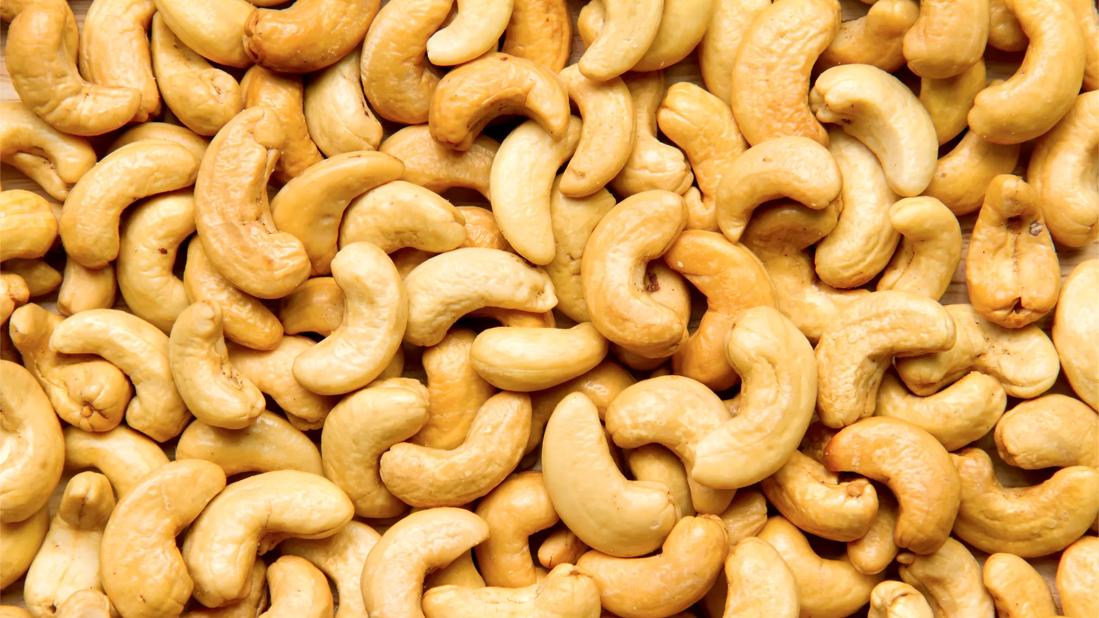Cashews may benefit your heart, joints and blood sugar levels

Image content: This image is available to view online.
View image online (https://assets.clevelandclinic.org/transform/ec440b31-4766-4167-81b5-fb4eece02c16/cashews-511301902)
Close-up pile of cashews
Cashews are nuts that form on the outside of a fruit called the cashew apple. There’s one nut on each fruit, and you can eat both the nuts and the fruits. Cashew trees grow in tropical areas. While we don’t typically see cashew fruit trees in the U.S., the nuts are a popular snack.
Advertisement
Cleveland Clinic is a non-profit academic medical center. Advertising on our site helps support our mission. We do not endorse non-Cleveland Clinic products or services. Policy
“Cashews have a creamy flavor and texture that sets them apart from other nuts,” says registered dietitian Julia Zumpano, RD, LD. “In addition to the taste, cashews offer a health boost.”
Most nuts, like almonds or walnuts, are full of healthy fats, fiber and minerals, and cashews are no exception. Zumpano outlines some of the potential benefits of cashews.
“Cashews contain abundant antioxidants, which fight the oxidative stress that plays a part in the hardening of your arteries, called atherosclerosis. Atherosclerosis leads to heart disease,” says Zumpano. “But antioxidants appear to help prevent this disease process.”
Research shows that cashews may benefit heart health in several ways:
A diet that includes cashews may help with high blood sugar.
Advertisement
“A study in people with Type 2 diabetes showed that eating cashews can benefit insulin levels,” says Zumpano.
In the study, people who got 10% of their calories from cashews for eight weeks found that they had healthier insulin levels than the people who didn’t. But Zumpano cautions, “Cashews can’t fix Type 2 diabetes — no single food can. Don’t focus too much on individual foods. A healthy diet should include plenty of variety.”
Research suggests cashews may help joint health. Eating nuts like cashews is associated with less inflammation, the swelling that’s a common, painful symptom of arthritis.
If you’ve ever tried to lose weight by watching your calorie intake, you may have been wary of cashews and other nuts. Anyone who reads food labels knows that cashews (and all nuts) are packed with fat and calories, and it’s easy to go overboard when you eat them.
“We often advise people who are trying to lose weight to be careful with nuts. An actual serving size is typically smaller than most people would eat in a sitting,” says Zumpano.
So, how can cashews help with weight loss? Research suggests that people who eat nuts have an easier time losing weight than those who don’t, possibly because of the high fiber and protein content in nuts, which may make you feel fuller and increase the number of calories you burn at rest. Weight gain is associated with choosing processed meats and snack foods; in contrast, when replacing with nuts on a regular basis, weight loss may occur.
But another study may shed some light on it. It found that people don’t absorb all of the calories in cashews. The researchers found that there was unused energy (calories) and undigested fat from cashews in participant’s poop. So, the actual level of calories and fat our bodies hold onto is a little less than the food labels would have us believe.
One ounce (28 grams) of cashews, which is about 18 cashews, provides:
It also provides several important nutrients:
Cashews are safe for most people, but be cautious if you have other known nut allergies.
And, again, if you’re watching your calorie intake, cashews can be tricky.
“Cashews are a great source of plant-based protein and several vitamins and minerals,” says Zumpano. “But they’re also dense in calories and fat. Roasted, salted cashews have added oil and salt, boosting the fat and sodium content. If you’re trying to limit your calorie, fat or sodium intake, just be aware of serving size.”
Advertisement
You can eat cashews on their own as a snack or as a garnish on salads or stir-fries. Most grocery stores also carry cashew-based vegan dairy options like cashew yogurt, cheese and ice cream. And cashew butter is one of the top nut butters. Try using cashew butter to make braised chicken with cashew gravy or in a dressing for Thai lettuce cups.
Advertisement

Sign up for our Health Essentials emails for expert guidance on nutrition, fitness, sleep, skin care and more.
Learn more about our editorial process.
Advertisement
The tropical fruit is a good source of antioxidants and vitamin C
High amounts of cholesterol and saturated fat in red meat may be linked to heart disease
The leaves and pods from this tree are rich in essential nutrients
This starchy root vegetable is a staple in many global cuisines — but it has to be prepared correctly, or it can cause serious concerns
These delicate green sprouts can give you an extra dose of vitamin K and other nutrients — but they’re not safe for everyone
Edamame, lentils and chicken breast are good sources of protein
Eating this root vegetable can help support your eye, heart and brain health
The flavorful herb is full of antioxidants that may help regulate blood sugar
Although it could be used as a moisturizer, this new trend is not recommended
Communicating clear limits helps protect your time, energy and emotional well-being
High cholesterol can be genetic, but testing and treatment can lower your heart disease risk